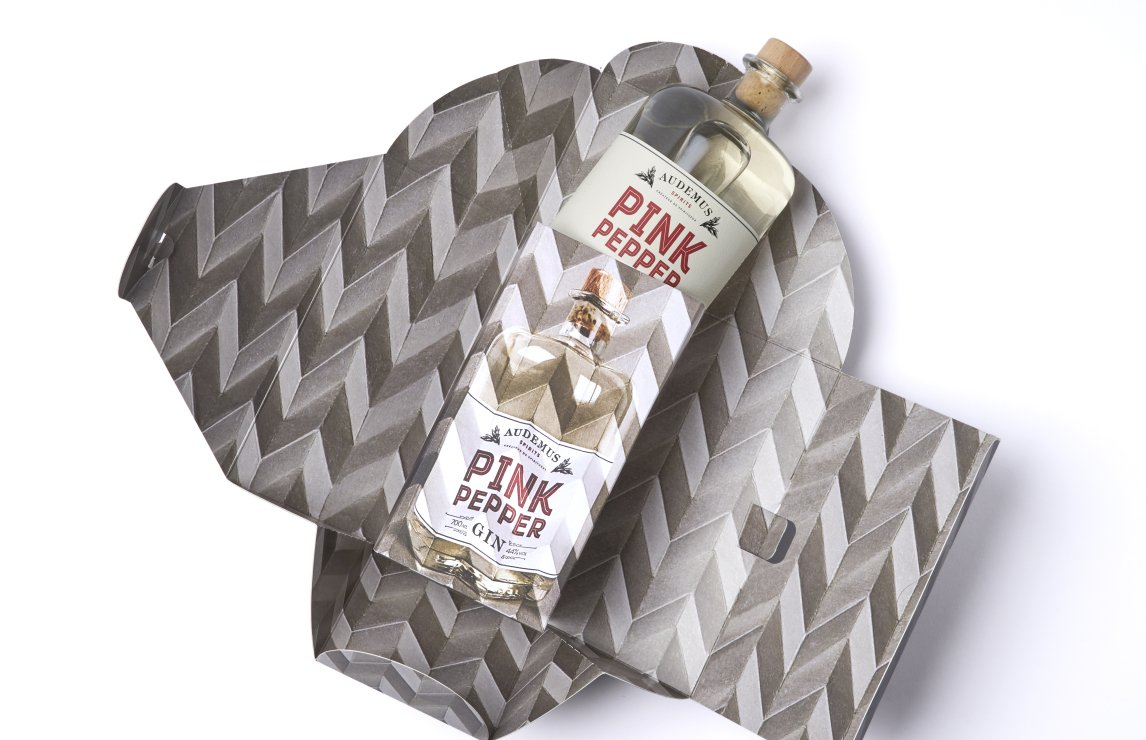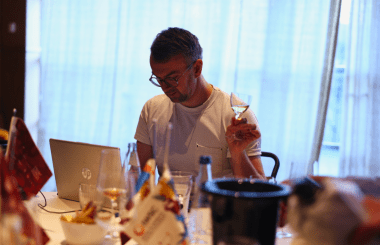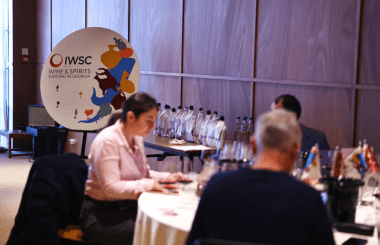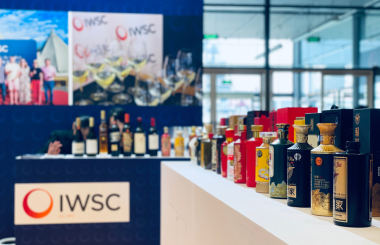IWSC Market Insight: sustainable spirits packaging
Audemus Pink Pepper Gin & Gift Box, made with sustainably sourced materials including vegetable inks.
IWSC Judge Sarah Miller shares some insight into the current trends, developments and initiatives around sustainable packaging - an increasingly hot topic within the spirits industry.
- Introduction
- Primary Packaging
- Labelling
- Closures
- Secondary/gift packaging
- Shipping packaging
- Conclusion/looking ahead
Introduction
Spirits packaging has long been about more than mere function. Bombay Sapphire’s revolutionary blue bottle, launched in the 1980s, not only made the brand instantly recognisable across back bars and supermarket shelves - and cemented its premium position - but also helped reinvigorate the entire gin category.
In today’s increasingly competitive post-pandemic market, brand identity and differentiation is more important than ever and products are under increasing pressure to be both highly photogenic - to stand out online - and environmentally friendly too.
The source of the environmental pressure, and financial incentive, is two-fold. Firstly, Government commitments to achieve net zero by 2050 - including the UK’s introduction of the Plastic Packaging Tax (PPT) in 2022, and Extended Producer Responsibility (EPR) for packaging in 2024 - means it will cost producers increasingly more to use less sustainable materials. Secondly, consumers - who take more cues about a brand’s sustainability initiatives from their packaging than anything else - are demanding change. According to Trivium Packaging’s 2022 Global Buying Green Report, 86% of consumers under 45 are willing to pay more for sustainable packaging, and 57% of consumers are “less likely” to buy products in what they perceive as harmful packaging.
Within the spirits industry in particular, there is no one-size-fits-all solution, and there is a risk some less scrupulous producers may play into customer confusion in an attempt to greenwash the liquid within their bottles. However, with 20-40% of a spirit’s carbon footprint attributed to its packaging - and 6% of all packaging waste (by weight) in municipal waste streams attributed to beverage containers - there is no doubt that real change can have true impact.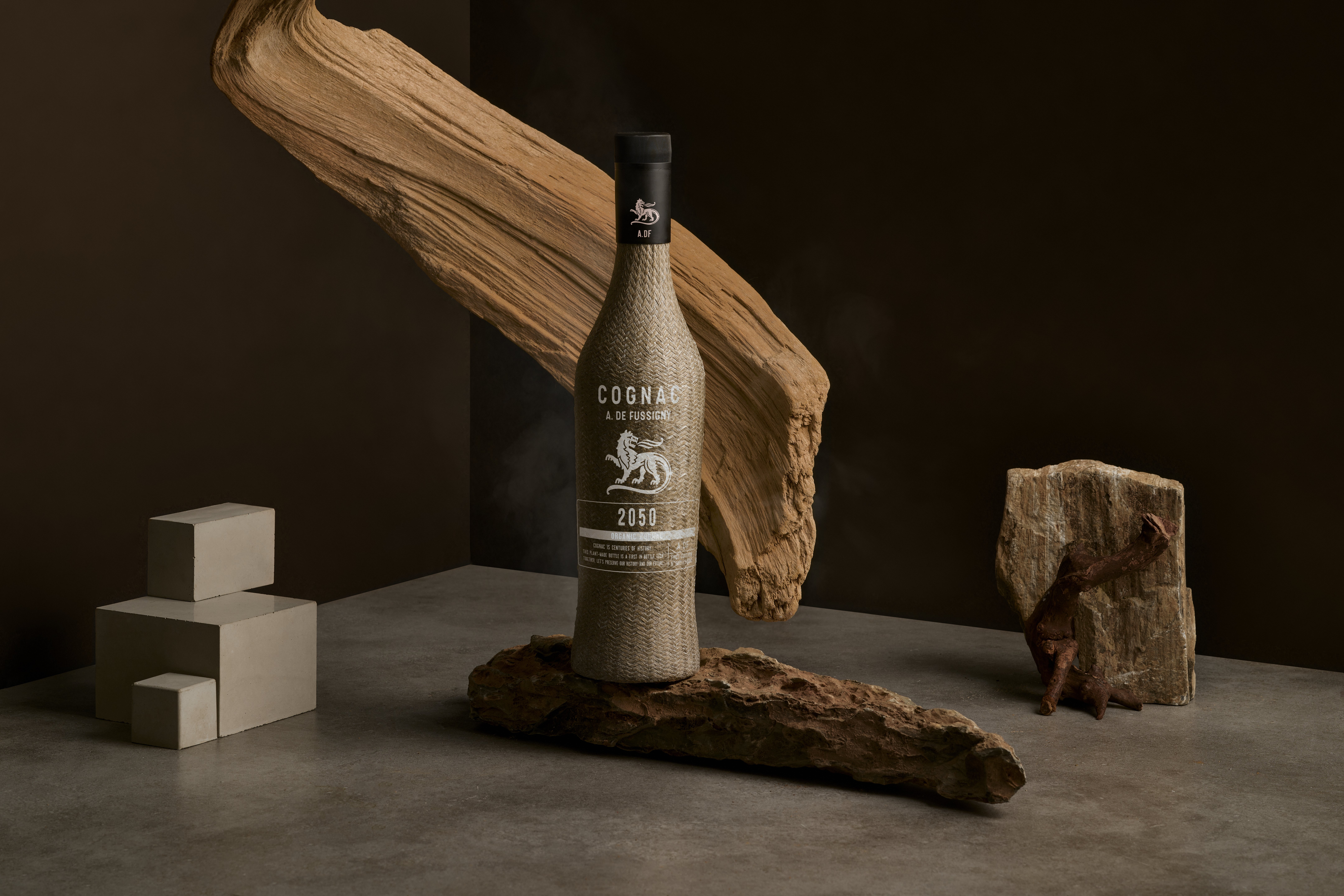
A de Fussigny's 2050 Cognac, made from flax fibers, plant-based resins and an RPET liner.
Primary Packaging: glass
Inert and impermeable, glass has been the packaging material of choice for liquids for hundreds of years, and still is for over 90% of spirits. However, producing glass requires huge quantities of raw materials including sand - the third most used resource on the planet - and is also exceptionally energy intensive, with furnaces required to reach temperatures of 1,300 to 1,500°C. EcoSPIRITS estimates that in 2020 alone, the world produced 40 billion single use glass spirit bottles, leading to 22 million tons of carbon emissions.
Launched in 2020 by the European Container Glass Federation (FEVE), the hybrid oxy-fuel ‘Furnace of the Future’ project may have failed to win the financial support of the EU Innovation Fund, but certainly succeeded in galvanising the industry towards one common goal. Ardagh Glass Packaging and Pernod Ricard have collaborated on a large-scale project that will, in late 2023, enable Absolut to reduce the carbon footprint of their vodka bottles by 20% by moving to a partly hydrogen-fired furnace. Glass manufacturer Encirc has also teamed up with Diageo to create the world’s first net zero glass bottles at scale. The UK furnace - powered by zero carbon electricity and hydrogen - is expected to be fully operational by 2027, and will initially reduce carbon emissions by 90%. Long-term carbon capture technology is then planned to remove the remaining emissions by 2030 when the plant is expected to be producing up to 200 million bottles annually.
For smaller brands however, the easier, cheaper and quicker way to reduce the carbon footprint of their packaging is to switch to bottles with a (higher) recycled glass content. Recycling glass not only avoids the extraction of further virgin raw materials, but cullet (crushed glass) also has a lower melting point, thereby reducing the energy consumption of the furnace as well as mitigating air pollution caused by off-gassing.
Bottle weight also has a significant impact - both in terms of the amount of glass used in production and in the carbon emissions related to shipment - which is why more producers are opting for locally sourced, lightweight bottles. North Yorkshire’s carbon neutral Ellers Farm Distillery shunned the conventional clear bottle for their Dutch Barn Orchard Vodka, opting instead for an amber bottle which not only contains 60% recycled glass, but is also exceptionally light - weighing up to 50% less than the average spirits bottle at 450g - and is manufactured just 60 miles from the distillery, resulting in an impressively low carbon footprint of 0.5kg CO2e (carbon dioxide equivalent). It may be divisive, but this unusual bottle colour has also been proven by the University of York to better preserve the delicate flavour and aroma of the apple-distilled vodka within, giving it yet another advantage in terms of sustainability.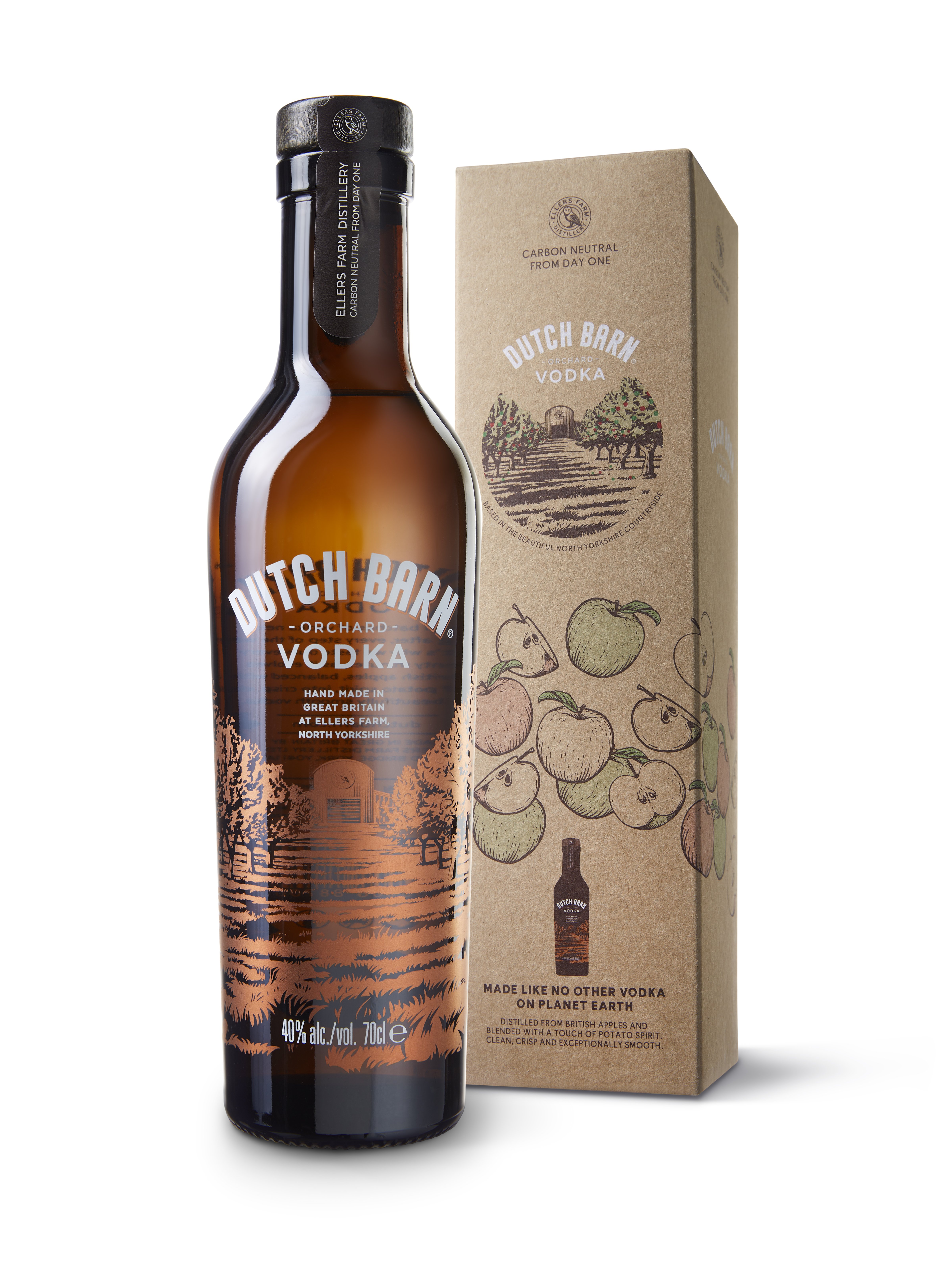
Ellers Farm Distillery Dutch Barn Orchard Vodka - weighing up to 50% less than the average spirits bottle.
Primary Packaging: reuse/refills
While using lightweight, recycled glass reduces the carbon footprint of a new bottle, reusing existing glass bottles is even more effective, as the emissions associated with production are distributed over its entire life cycle. Most deposit return schemes tend to focus on recycling rather than reusing bottles due to logistical challenges - such as the lack of standardisation in spirits packaging - but, as part of their “One Bottle for Eternity” project, Rémy Cointreau Group will run a pilot deposit system on Barbados to involve the collection, cleaning and refilling of their locally produced Mount Gay Rum. The brand hopes to reuse 30-40% of all bottles sold locally, with an estimated 60% CO2 saving per bottle.
As part of the same Rémy Cointreau project, premium cognac producer Louis XIII have launched The Infinity Wheel; a system allowing their hand-crafted decanters to be refilled an unlimited number of times in their brand boutiques. The two-day process also involves inspecting, cleaning and digitally recording the decanter before an engraved medal with its unique refill number is placed around its neck.
While growing numbers of distilleries offer similar - though less elaborate - refill services, others such as East London Liquor Company, York Gin and Northern Ireland’s Boatyard Distillery have taken the concept one step further by allowing customers to refill any empty 70cl bottle (not just those which previously contained its own products) with their spirits before affixing a new label and duty stamp.
While such systems are dependent on customers making the trip to participating distilleries or shops, empty bottle in hand, other producers have adopted a different approach. Reuse is at the core of One Spirits’ new bespoke carafe-style Butterfly Bottle which reveals the word “WATER” debossed into the front of the bottle when its label is removed. Meanwhile, Scotland’s Dunnet Bay Distillers offer customers the option to purchase a pump to upcycle their ceramic bottle into a soap dispenser or a pouch to refill it. The 70cl plastic pouches are exceptionally lightweight at just 17g, have a significantly lower carbon footprint than their ceramic bottles and can be recycled through their freepost return scheme in collaboration with Terracycle. There are, however, unavoidable issues in creating single-use plastic from virgin materials, which is why other producers have opted for infinitely recyclable aluminium containers, such as Wales’ Silver Circle Distillery whose 50cl Wye Valley Gin refill can weighs 12g empty, 48g full, and can be recycled kerbside. 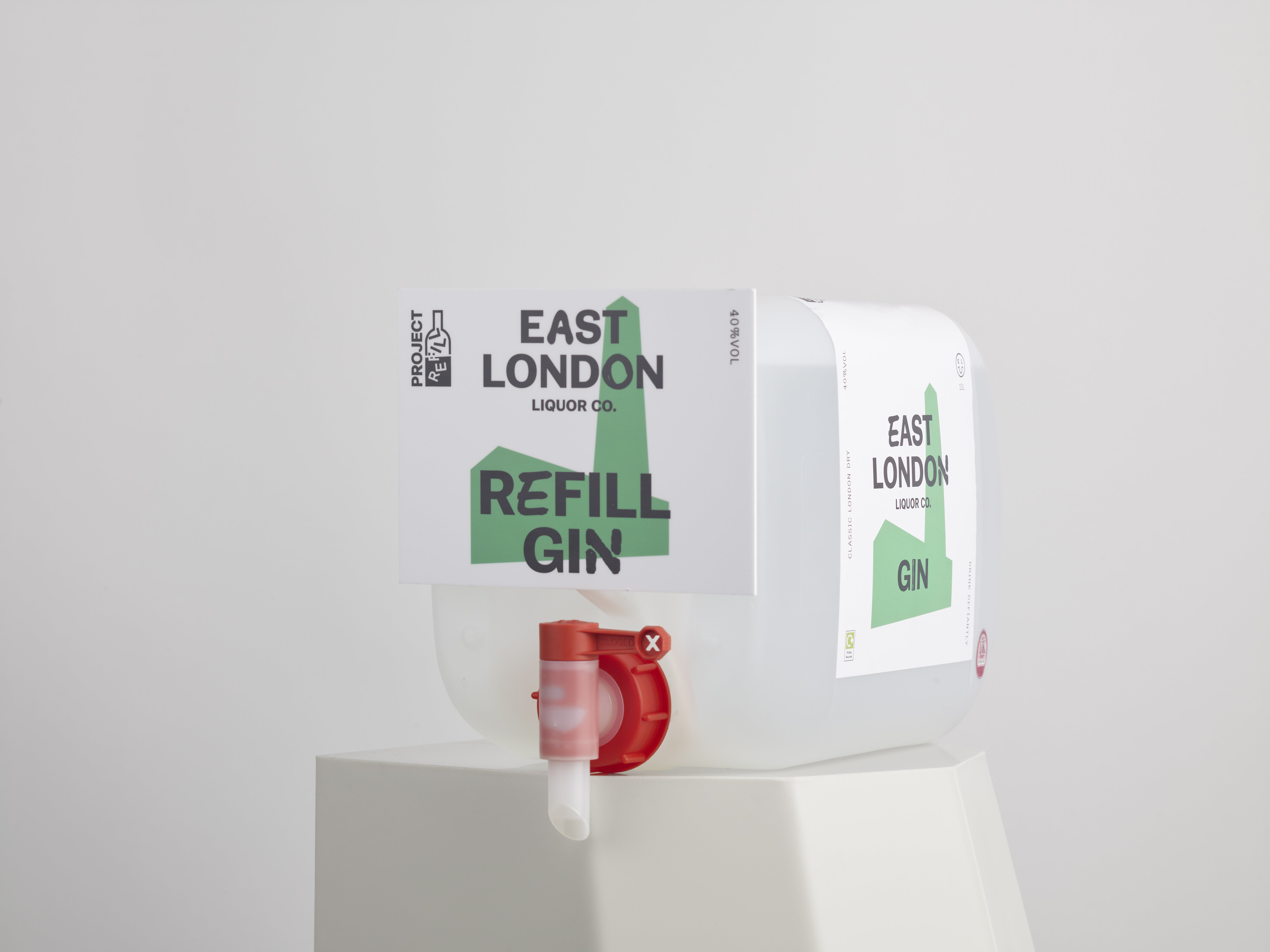
East London Liquor Co Refill Gin - as part of Project Refill.
Primary Packaging: alternatives to glass
For those brands eschewing glass altogether there are a growing number of alternatives. Millions have been invested in the production of paper bottles, such as Diageo's Pulpex and Carlsberg and The Absolut Company’s Paboco, but neither are expected to be rolled out at scale before 2025. Currently leading the paper bottle race is FrugalPac. Adopted by Avallen Calvados, Greenall’s Gin and Green Man Spirits, the Frugal Bottle consists of a food-grade pouch inside a chemical-free recycled paperboard bottle and has a carbon footprint 77-84% lower than a glass bottle.
However, amid sharp price raises in paper, impending supply shortages and concerns regarding the high levels of water usage and water pollution risks in paper production, A de Fussigny has released its 2050 Organic Cognac in The Green Gen bottle. Designed and manufactured in France - the world’s leading producer of flax plants (which are not water-intensive to grow) - the lightweight bottle is made of natural flax fibre and organically-sourced bio-based resins.
Both the Frugal and Green Gen bottles are exceptionally lightweight - at approximately 85g each - but the plastic liners that both bottles contain warrant further scrutiny, with only 9% of plastic waste recycled globally and less than 4% of plastic film currently recycled in the UK.
Aluminium, on the other hand, is widely and infinitely recyclable - 75% of all aluminium produced is still in the material loop today - in addition to being lightweight and requiring less packaging in transit than glass. Aluminium bottles have already been adopted by Brazil’s BEG Gin and Scotland’s Shoogle Spirits and Isle of Harris Distillery as 50cl refill options, but it is Herefordshire’s Penrhos Spirits who - groundbreakingly - intend to fully transition from glass to 100% recycled 70cl aluminium bottles throughout 2023 (although the speed of that transition will be dependent on consumer appetite).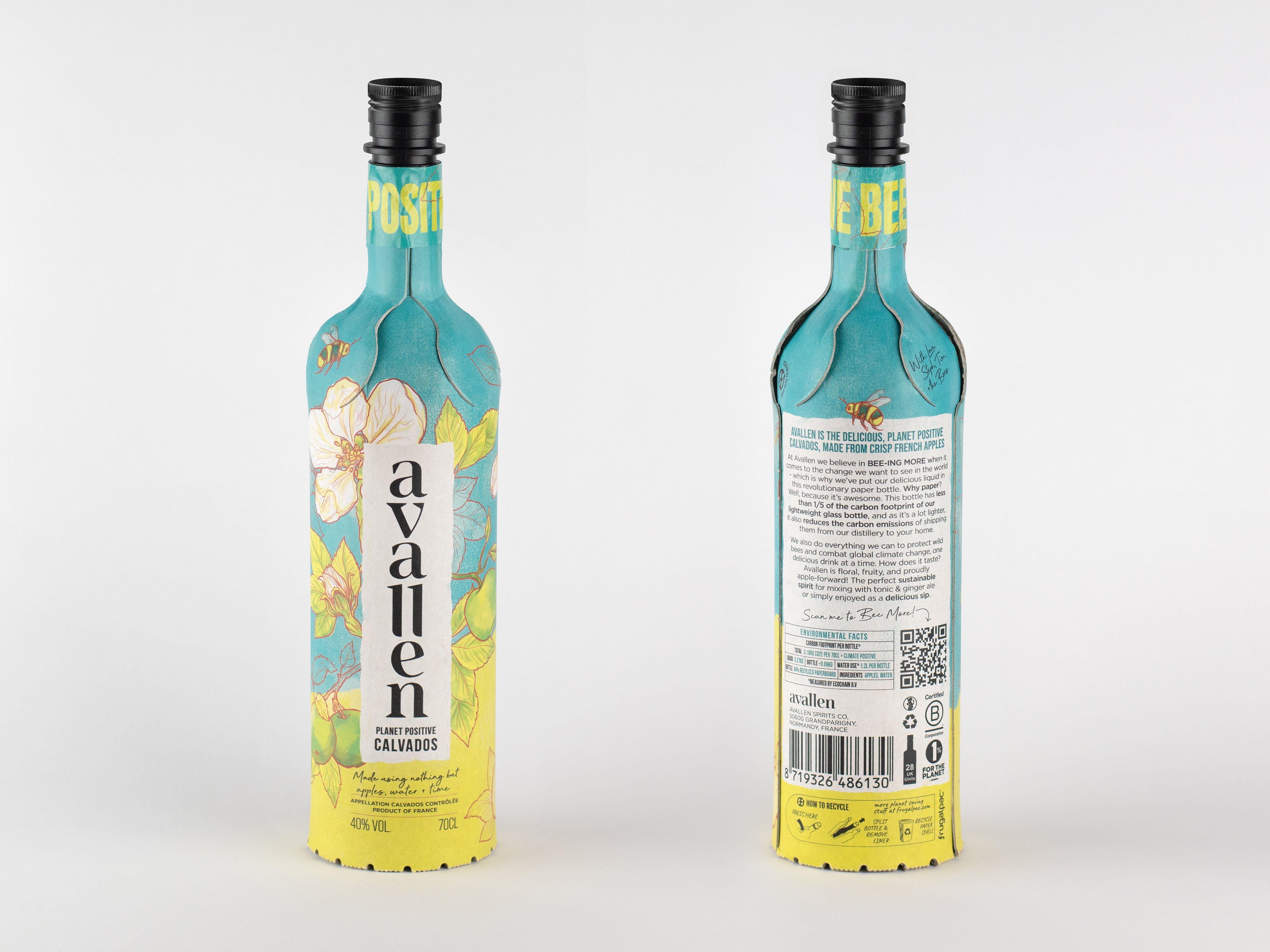
Avallen Calvados FrugalPac Bottle - with a carbon footprint of up to 84% less than a glass bottle.
Labelling
Much like the Frugal Bottle and Penrhos’s aluminium bottle, Nc’nean and North Point Distillery have ditched labels altogether and opted instead to screenprint their 100% post-consumer recycled glass bottles using environmentally-friendly inks which prevent leaching. Taking things one step further, Johnnie Walker’s “Keep Walking City Collection” bottles feature illustrations printed using AIR-INK® - an ink created by condensing the carbon-based gaseous effluents generated by air pollution.
While there is also innovation within the category of more traditional labels - Two Drifters Rum’s are produced from 95% bagasse (the by-product of sugar cane manufacturing) alongside hemp and linen fibres - digital or smart labels represent the next evolution of packaging technology.
Although not currently allowed for all food and drink products, regulators in Italy have permitted producers to provide mandatory packaging and disposal information digitally. Thanks to a collaboration between U-Label - the European e-label platform for wines and spirits - and Italian-based app developer Giunko, consumers will be able to access the nutrition declaration and list of ingredients for a product, as well as geo-localised disposal information for all its packaging components, by scanning a single QR code with a smartphone. Offering not only transparent, multilingual information, but also improved accessibility, Pernod Ricard plans to roll out their digital label across all brands in their portfolio in 2024.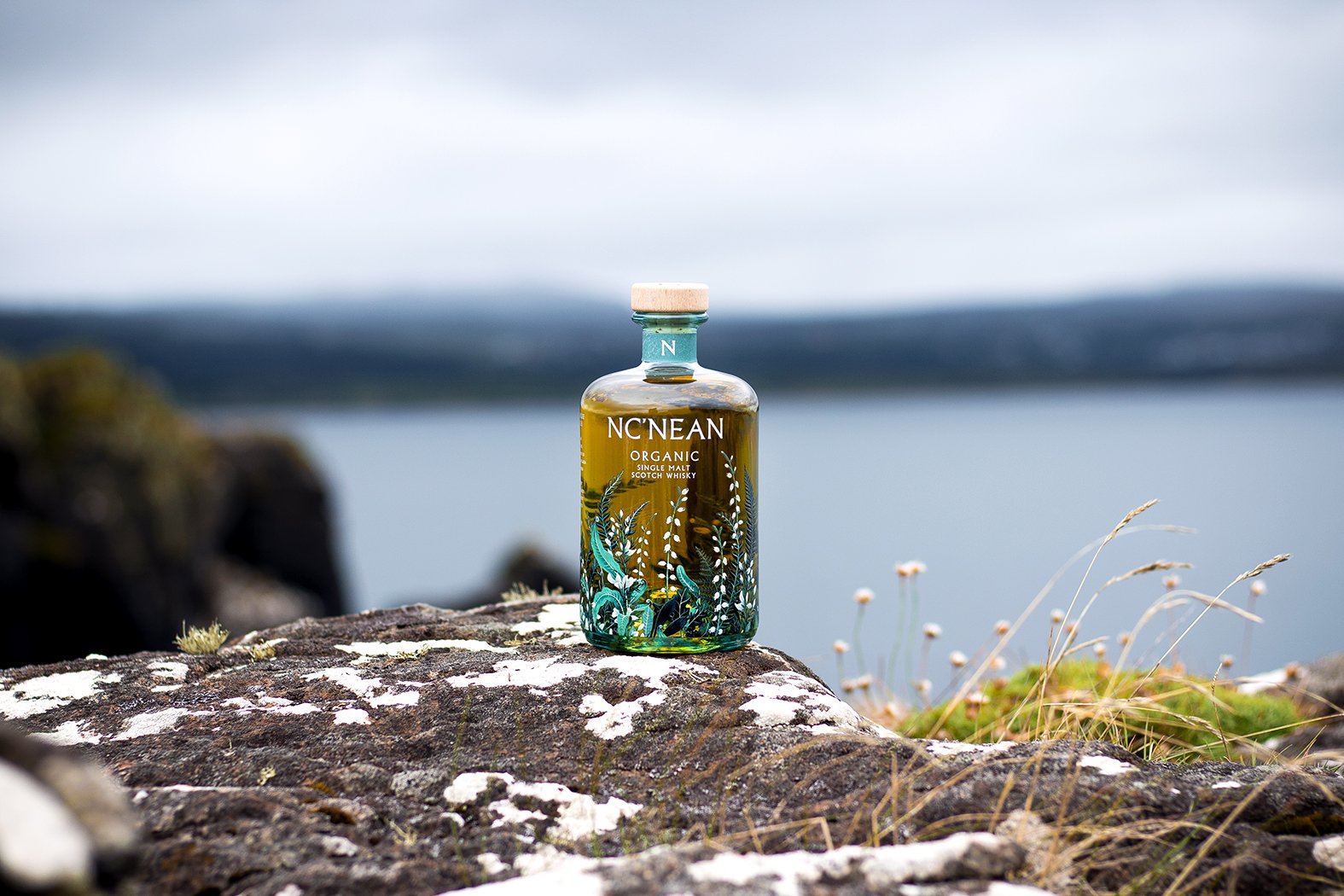
Nc'nean's bottle design uses environmentally-friendly inks which prevent leaching.
Closures
The pursuit of eco-friendly solutions has resulted in a widespread move away from multi-material closures fixed with glue, and back towards glass, aluminium and, in particular, natural cork which supports biodiversity, prevents desertification and has a negative carbon footprint.
In an effort to make the most sustainable stopper, Estal has combined cork with activated charcoal to create Corkcoal®. The addition of activated charcoal not only reduces waste - by allowing greater variation in the cork micro granulate - but also naturally neutralises undesirable flavours and smells (such as cork taint or TCA) meaning fewer washing processes and no chemical bleaches are necessary. The activated charcoal even accelerates the biodegradation process of the stopper at the end of its life cycle too.
While the monobloc design of such stoppers are efficient and sustainable, they leave little room for customisation. Estal will be producing Corkcoal® stoppers with wooden outer rings (fixed by pressure rather than glue) in 2023, but there are other innovative solutions for brands seeking a bespoke look, including BioAgave caps produced using waste from the production of Tequila and Salcombe Distillery’s New London Light stopper created from reclaimed ocean plastics.
However, one of the most innovative is surely Talis’s Bloom capsule. Created from a combination of a bio-based polymer and cork granules that are a by-product of production, the capsule is fully customisable and can be coloured and scented to mirror the liquid inside the bottle and enhance the consumer experience. Talis is also working towards becoming carbon neutral and is set to reduce energy consumption at its new plant in Portugal by 19% by 2025. You can read more about their sustainability initiatives and commitments here.
Last year, the IWSC hosted an online discussion on Sustainability in Closures, featuring Labrenta – an Italian manufacturer with over 50 years of experience within luxury closure production. You can read more about their pioneering work here, including the Labrenta Green Deal 2030.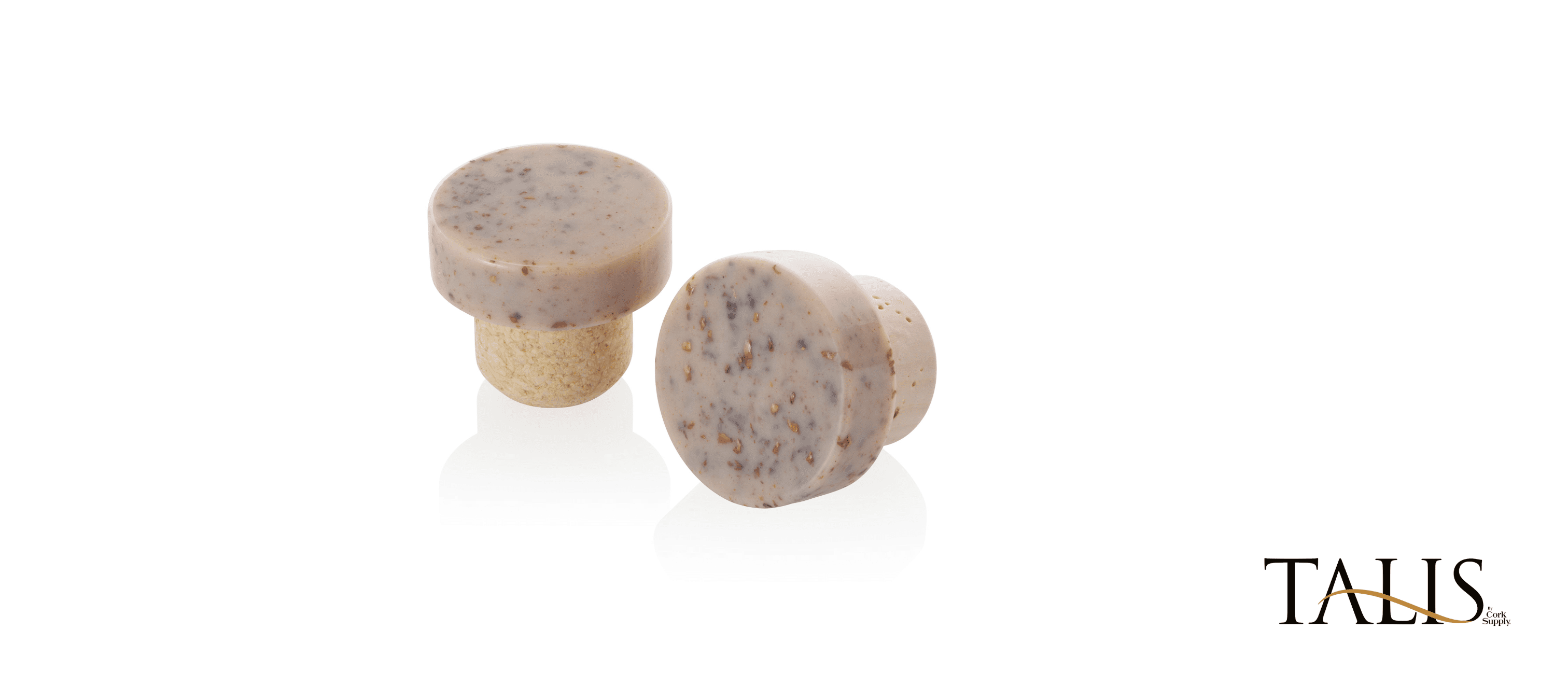
Talis's Bloom capsule, created using bio-based polymer and cork granules - a by-product of production.
Secondary/gift packaging
Much like primary packaging, eye-catching gift packaging is often demanded by consumers - and stockists - to make a product more desirable, and is a particular problem in the whisky industry which was declared a “recycling villain” in 2017 primarily for its ubiquitous cardboard tubes with metal lids and bonded metal bases.
Scotland’s net zero organic whisky distillery Nc’nean instead produces a 90% recycled cardboard gift tube and, since offering it as an optional extra, have seen consumer demand decrease from 95% to 60%. Despite the whisky market still largely demanding gift boxes, Bruichladdich has taken the bold step of completely withdrawing the tinned packaging for its heavily-peated Port Charlotte range: a move they aim to extend across their entire portfolio. Meanwhile, in April 2022, Diageo announced a programme to phase out the use of 183 million cardboard gift boxes from its global premium Scotch portfolio and, as of December 2022, all new gift packs in the Bacardi portfolio will be 100% plastic-free, removing almost 275 tons of the single-use material annually.
As some brands such as Bombay Sapphire, Sipsmith and The Macallan begin to experiment with repurposed materials including, respectively, packaging made from depectinised citrus pulp (the by-product of citrus juicing), recycled coffee cups and discarded coffee bean husks, others have focused instead on creating packaging that can be reused.
Audemus Spirits’ beautiful gift boxes are made from sustainably sourced materials and, while they are fully recyclable, the packs also transform into cocktail books designed to be kept and treasured. Meanwhile the imposing wooden boxes containing Glengoyne 25 and 30 Year Old Whiskies feature personalisable plaques, peelable labels and removable inner fitments to enable easy reuse, and Guatemalan brand Zacapa released a limited-edition wooden coffret that houses the Zacapa 23 Rum and also breaks down into six drinks coasters.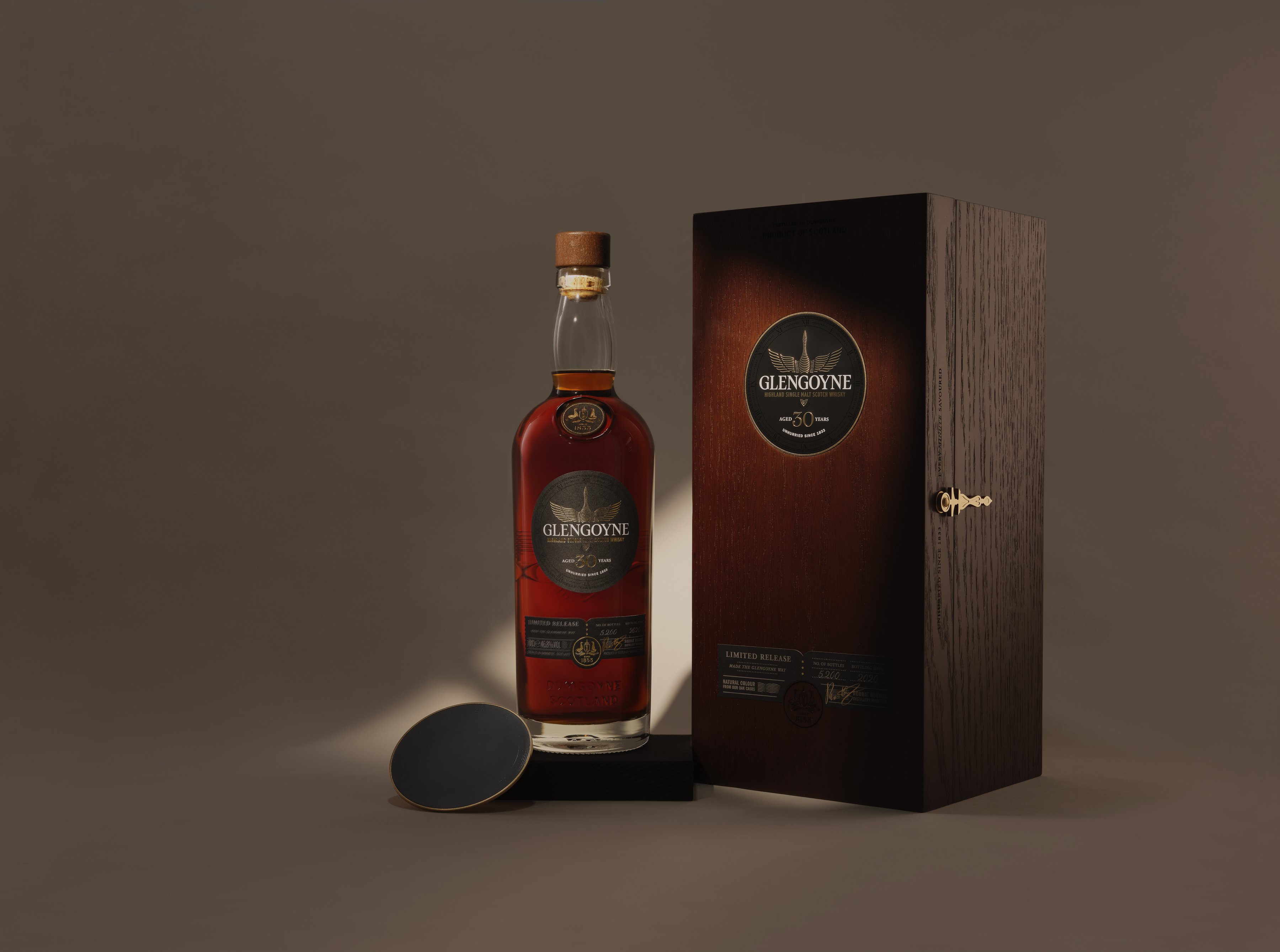
Glengoyne's resuable wooden boxes include peelable labels and removable inner fitments.
Shipping packaging
To be as sustainable as possible, shipping packaging needs to be both fit for purpose - to prevent breakages and waste - and as light as possible. Inflatable plastic Airsacs largely fit this criteria (if not all bottle shapes and sizes) but producers are increasingly looking for more environmentally friendly solutions such as Flexi-Hex’s innovative honeycomb sleeves made from 85% recycled paper pulp. Despite being manufactured in China and India, the remarkably lightweight and compact sleeves are nonetheless cost effective to ship (although Flexi-Hex does offset related emissions to remain carbon neutral as a business).
While bespoke cardboard boxes, Flexi-Hex and cheaper, more imaginative solutions - such as recycling waste cardboard into netting, and cushioning bottles with spare sheep’s wool - are ideal for shipping direct-to-consumer, they are not suitable for larger shipments and exports.
Asia-based, but with huge global ambitions, The Orientalist Spirits is exploring shipping just their liquids, rather than fully packaged products, for bottling on arrival in key markets. While bulk shipment is not feasible for some spirits with a registered Geographical Indication (GI) - such as Single Malt Scotch Whisky and 100% Agave Tequila which have to be made and bottled in their country of origin - it can be a good solution for both export and delivery to on-trade venues, where individual bottles are rarely required and often take up limited space.
Founded in 2018, ecoSPIRITS is a world’s-first closed-loop distribution system that aims to eliminate single-use glass in the spirits industry. Working with almost 100 brands, including Arbikie’s Nadar Gin, Smirnoff Vodka, Don Q Rum and Cointreau, ecoSPIRITS now deliver their reusable and refillable 4.5-litre totes - which eliminate 70–90% of the CO2 associated with the packaging and distribution of spirits - to more than 1,500 venues in 15 countries across Asia Pacific, Europe and the Americas.
As ever, smaller, sustainably minded producers have found equally innovative solutions working within their local markets, such as Electric Spirit Co. who agreed a refill system using 5-litre stainless steel kegs with Edinburgh’s The Palmerston restaurant. With each keg saving 4.5kg of weight (and related emissions) compared to the equivalent amount of bottled gin, they have since rolled out the offer to other nearby venues.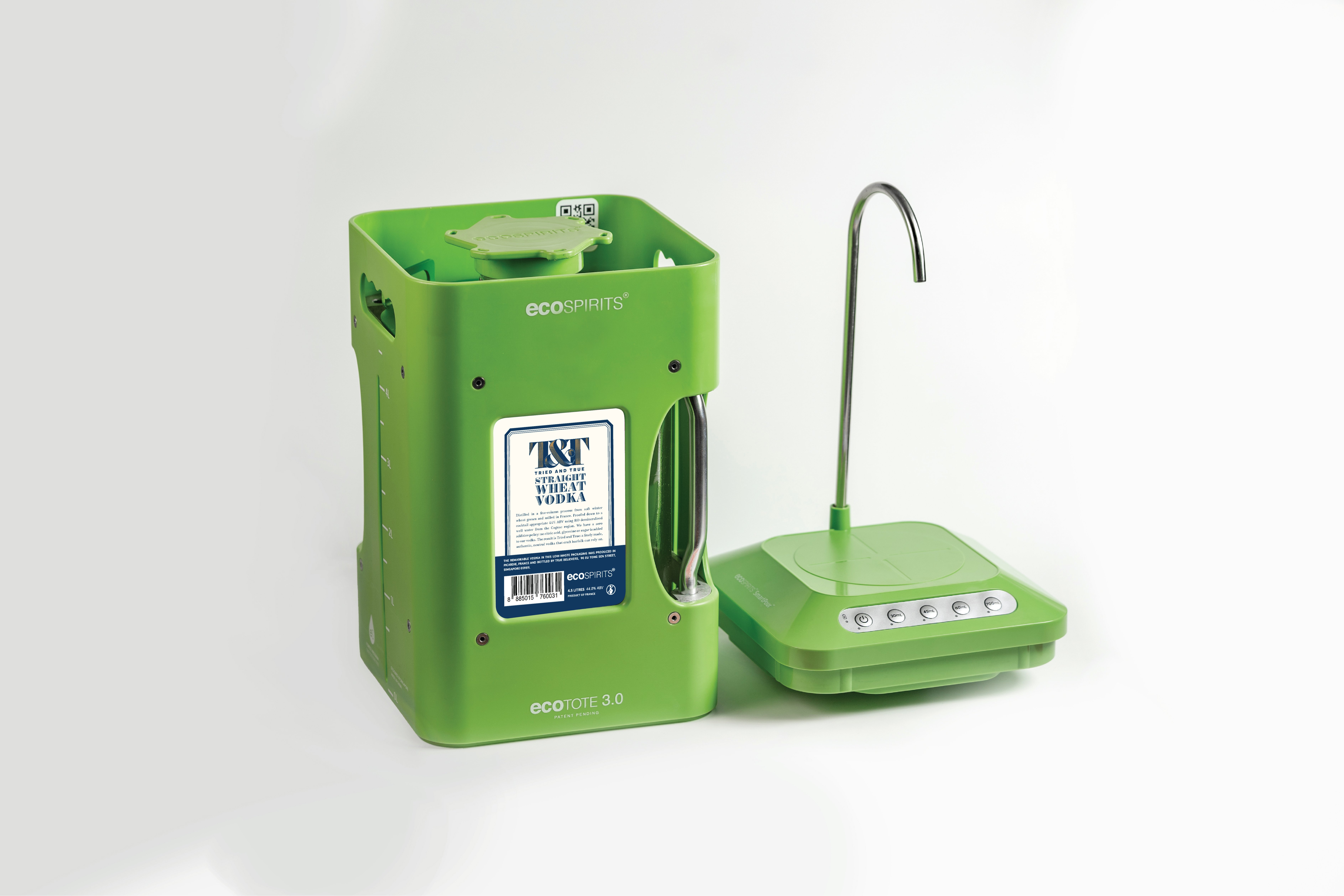
An example of the reusable and refillable 4.5-litre tote from ecoSPIRITS.
Conclusion/looking ahead
Returnable, refillable, zero-waste systems are undoubtedly key to developing more sustainable packaging solutions, and indeed the EU Packaging & Packaging Waste Regulation (PPWR) proposals (published in November 2022) include reuse targets for the first time. These targets have not, however, been made mandatory in the spirits industry due to its unique challenges, including a large export market, long supply chains and GI regulations and rules governing bottling in third countries; a move welcomed by FEVE and spiritsEUROPE.
However, producers still face plenty of challenges. In addition to rising costs and the confusion surrounding the UK’s various deposit return schemes - the first of which is due to go live in Scotland in August 2023 despite delays, rollbacks and ongoing criticism from industry leaders - the EU’s proposed PPWR rules will no longer permit ‘marketing’ and ‘consumer acceptance’ as legitimate packaging performance criteria. If enforced, warns spiritsEUROPE, this standardisation of packaging will not only negatively affect consumer choice and brand identity but also drastically restrict possibilities in product design.
From micro-distilleries to global brands, the industry has widely demonstrated a commitment, and innovative approach, to making packaging more sustainable while also maintaining crucial brand differentiation. Given how much producers have achieved despite the difficulties of the last three years, perhaps it is now time for the Government to withdraw some pressure and trust the consumer to drive the change.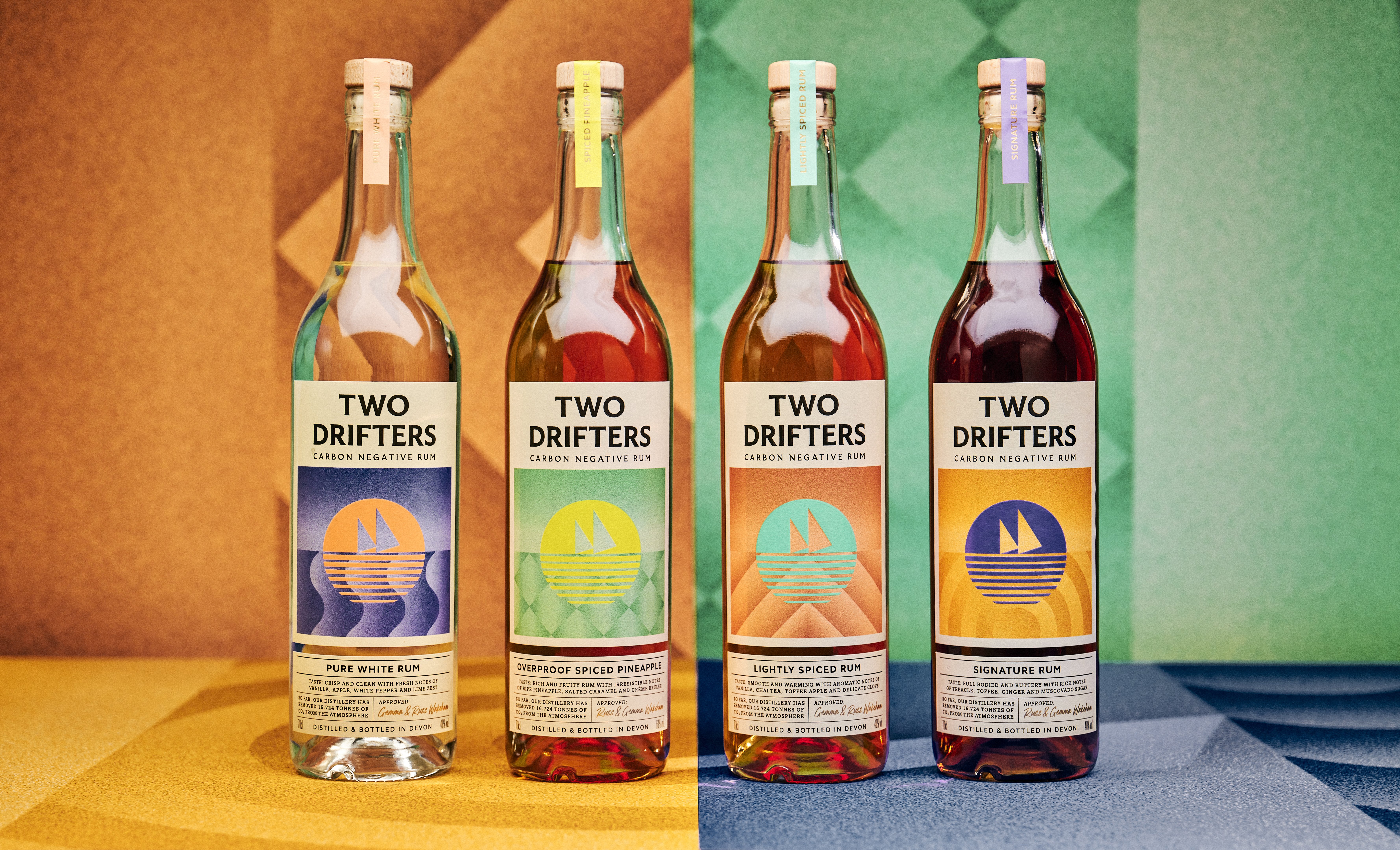
Two Drifters' range of carbon negative rum, with labels produced from 95% bagasse.
Don't forget to enter the IWSC’s 2023 Design Awards, which include an Eco-Friendly category.
If you’re looking for more content on sustainability, you can watch the IWSC’s most recent webinar on Luxury & Sustainability in Packaging here, which features insight from Ana Lopes Cardoso and Margarido Faro of Talis.
